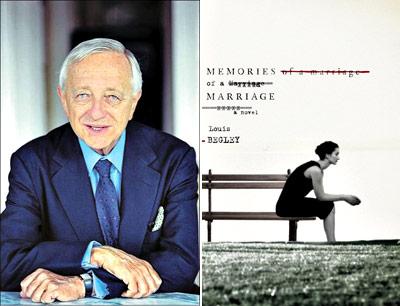Long Island Books: The Trouble With Money

“Memories
of a Marriage”
Louis Begley
Nan A. Talese/Doubleday, $25.95
I live in Springs. I have no idea how they live South of the Highway.
Rock stars, movie divinities, hedge fund wizards, white-collar bandits — the world lifts its wondering eyes to the oceanside Hamptons. TVs and tabloids, commercial books and magazines, they all feed on fame and fortune.
But what if the truth got out?
What if a spy revealed it all to be somewhat of a fraud, much like the fraud that placed many of our plastic heroes on their pedestals in the first place?
Well, thank goodness for Louis Begley.
In “Memories of a Marriage,” he takes us inside the marriage and the “culture” of one miserable couple, Lucy and Thomas Snow — he, a rags to Wall Street fella, she the progeny of an old Rhode Island family coasting through life on booze, promiscuity, and shrinks.
Along the way we meet their friends, not a bad lot really. They live in Paris, Geneva, London, Park Avenue (West Side is best), Water Mill, Southampton, and East Hampton, all the swell spots. They invest in the correct clothes, wine, and sunglasses. Their problem is money — too much of it. Money corrupts and absolute money corrupts usually. Symptoms: boredom, a sense of being of no use to anyone except those who want to use you, and did I mention boredom?
Details of the problem: Our first-person novelist narrator (modeled on Mr. Begley himself) meets Lucy De Bourgh at the ballet in New York. She is the ex-wife of Thomas Snow, Harvard graduate, Wall Street superhero, now dead — run over by a speedboat while vacationing. Lucy, reaching back many years, reveals to our narrator, “I couldn’t have gone on living with that monster.”
Lucy is now, in her advancing age, a humorless harridan. Our narrator remembers her as a happy hellion. A Miss Porter’s and Radcliffe grad drifting from bed to bed ready for any adventure, and shockingly beautiful. He also recalls husband Thomas as a dignified, if quiet, gent of enormous financial renown. He advises the president of France, for gosh sake, even though his parents ran a garage outside of Newport, R.I. That’s where he met Lucy. Lucy considers him to have been a mere “townie,” a climber who used her social status and family trust fund to rise.
Throughout this slim novel, Mr. Begley investigates their horrid marriage by constantly questioning Lucy and Tom’s friends, and their only child, a son, to piece together this raw portrait of a sad coupling — think Flaubert’s “Madame Bovary,” Yates’s “Revolutionary Road,” and Albee’s “Who’s Afraid of Virginia Woolf?”
Over five decades, right up to the present time, Mr. Begley affords us a fascinating glimpse into the doings of the rich and notorious. The Persian cat is out of the bag and it ain’t so great.
Louis Begley has been in this territory before, most notably in “About Schmidt,” that hilarious sketch of a used-up executive and widower brought to film by Jack Nicholson. Mr. Begley’s story is just as fascinating as his 10 novels. He was a lawyer with the distinguished firm of Debevoise & Plimpton when he surprised his fellows by publishing a first novel, “Wartime Lies,” about a young Polish Jew caught up in the Holocaust. That novel appeared in 1991 when Mr. Begley was 57 and won several prizes. In the decades since, Mr. Begley has published many novels, among them “The Man Who Was Late” (1992), “As Max Saw It” (1994), “About Schmidt” (1996), and “Schmidt Delivered” (2000).
Born in Poland in 1933, Mr. Begley — then Ludwik Begleiter — survived the Holocaust through circumstances that parallel the trials of the protagonist in “Wartime Lies.” Separated from his father, he and his mother managed to survive the war by passing as Aryan. Reunited after the war, the Begleys migrated to New York, where they adopted a new life and a new language. In 1954 Mr. Begley graduated from Harvard, where he was a member of the Harvard Advocate literary magazine.
I had the opportunity to talk with Mr. Begley years ago at a New York party. Urbane, soft-spoken, impeccably attired in a dark suit, he presented a lawyerly calm. Only the barest trace of an accent suggested that he hadn’t just come from the pages of a Louis Auchincloss novel.
But there is nothing Auchinclossian about Mr. Begley’s work. Its outwardly civilized world is often a stage for corruption and, in his first book, barbarity. His novels demonstrate knowledge of the world as it is. The mechanics of high-level finance (stock options, trusts, sharing of proceeds agreements) remind us of Mr. Begley’s long experience as a working lawyer.
He makes an able spy for we the 99 percent as we consider the sins and powers of the 1 percent. As Mr. Begley’s narrator concludes, “I wasn’t sure I understood Thomas and Lucy better, and I wasn’t sure that I cared. A great impatience had overcome me.” I concur.
I think I’ll stay in Springs.
Bill Henderson is founder and publisher of the Pushcart Press. His latest book is “All My Dogs: A Life,” from David R. Godine.
Louis Begley lives in New York and Sagaponack.
